Phantom Go
Phantom Go is an imperfect-information variant of the game of Go. In regular Go two players move alternating on one game board overseeing the full game board. In Phantom Go, each player is not told where the opponent put his stones. Thus, each player has to induce the position of the opponent's stone. The game is played with a referee. Three game boards are used. One by the referee, one by each player. The referee's game board contains the pieces of both players. The players play out their moves on their respective Go board after inquiring from the referee whether their moves are legal. E.g., a move can be illegal if the position to be played is already occupied on the referee's board. If the referee finds a move to be illegal, the player may attempt playing another move.
While Go is a perfect- information game, Phantom Go is an imperfect-information game: both players can have different knowledge about the game state. Therefore, Phantom Go can be said to be more complex than regular Go. At this moment Go programs do not beat the world's top human players, for Phantom Go it is even not known how well human players perform, since the variant is not played frequently.
information game, Phantom Go is an imperfect-information game: both players can have different knowledge about the game state. Therefore, Phantom Go can be said to be more complex than regular Go. At this moment Go programs do not beat the world's top human players, for Phantom Go it is even not known how well human players perform, since the variant is not played frequently.
At the Games and AI group Joris Borsboom developed the Phantom Go program In the Dark for his Master's thesis. The program participated in the 12th Computer Olympiad in 2007.
J. Borsboom, J-T Saito, G.M.J-B. Chaslot, and J.W.M.H. Uiterwijk (2007). A Comparison of Monte-Carlo Methods for Phantom Go. In M. Dastani and E. de Jong, editors, Proceedings of The 19th Belgian-Dutch Conference on Artificial Intelligence, pp. 57-64.
